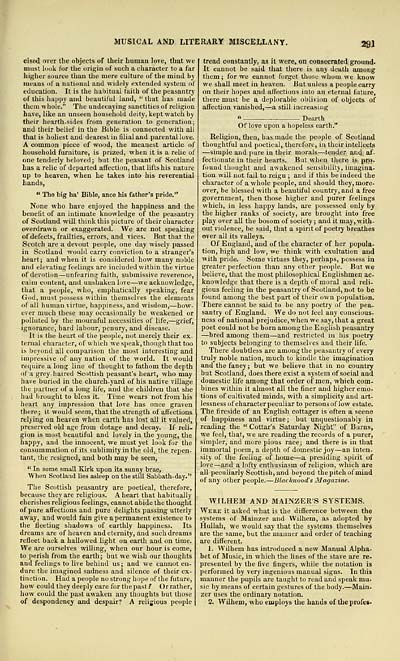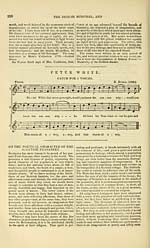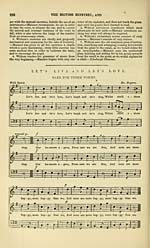Glen Collection of printed music > Printed music > British minstrel, and musical and literary miscellany
(299) Page 291
Download files
Complete book:
Individual page:
Thumbnail gallery: Grid view | List view

MUSICAL AND LITERARY MISCELLANY.
^m
cised over the objects of their human love, that we
must look for the origin of such a character to a far
higher source than tlie mere culture of the mind bj
means of a national and widely extended system of
education. It is the habitual faith of the peasantry
of this happy and beautiful land, " that has made
them whole." The undecaying sanctities of religion
have, like an unseen household deity, kept watch by
their hearth-sides from generation to generation;
and their belief in the Bible is connected with all
that is holiest and dearest in filial and pai'ental love.
A common piece of wood, the meanest article of
household furniture, is prized, when it is a relic of
one tenderly beloved; but the peasant of Scotland
has a relic of departed affection, that lifts his nature
up to heaven, when he takes into his reverential
hands,
" The big ha' Bible, ance his father's pride."
None who have enjoyed the happiness and the
benelit of an intimate knowledge of the peasantry
of Scotland will think this picture of their character
overdrawn or exaggerated. We are not speaking
of defects, frailties, errors, and vices. But that the
Scotch are a devout people, one day wisely passed
in Scotland would carry conviction to a stranger's
heai't; and when it is considered how many noble
and elevating feelings are included within the virtue
of devotion — unfearing faith, submissive reverence,
calm content, and unshaken love — we acknowledge,
that a people, who, emphatically speaking, fear
God, must possess within themselves the elements
of all human virtue, happiness, and wisdom, — how-
ever much these may occasionally be weakened or
polluted by the mournful necessities of life, — grief,
ignorance, hard labour, penury, and disease.
It is the heart of the people, not merely their ex-
ternal character, of which we speak, though that too
is beyond all comparison the most interesting and
impressive of any nation of the world. It would
require a long line of thought to fathom the depth
of a grey-haired Scottish peasant's heart, who may
have buried in the church-yard of his native village
tlie partner of a long life, and the children that she
had brought to bless it. Time wears not from his
heart any impression that love has once graven
there; it would seem, that the strength of affections
relying on heaven when earth has lost all it valued,
preserved old age from dotage and decay. If reli-
gion is most beautiful and lovely in the young, the
happy, and the innocent, we must yet look for the
consummation of its sublimity in the old, the repen-
tant, the resigned, and both may be seen,
" In some small Kirk upon its sunny brae,
When Scotland lies asleep on the still Sabbath-day."
The Scottish peasantry are poetical, therefore,
because they are religious. A heart that habitually
cherishes religious feelings, cannot abide the thought
of pure affections and pure delights passing utterly
away, and would fain give a permanent existence to
the fleeting shadows of earthly happiness. Its
dreams are of heaven and eternity, and such dreams
reflect back a hallowed light on earth and on time.
We are ourselves willing, when our hour is come,
to perish from the earth; but we wish our thoughts
and feelings to live behind us ; and we cannot en-
dure the imagined sadness and silence of their ex-
tinction. Had a people no strong hope of the future,
how could they deeply care for the past.' Orrather,
how could the past awaken any thoughts but those
of despondency and despair? A religious people
tread constantly, as it were, on consecrated ground.
It cannot be said that there is any death among
them ; for we cannot forget those whom we know
we shall meet in heaven. But unless a people carry
on their hopes and affections into an eternal future,
there must be a deplorable oblivion of objects of
affection vanished, — a still increasing
Dearth
Of love upon a hopeless earth."
Religion, then, has made the people of Scotland
thoughtful and poetical, therefore, in their intellect^
— simple and pure in their morals — tender and af-
fectionate in their hearts. But when there is pro-
found thought and awakened sensibility, imagina-
tion will not fail to reign ; and if this be indeed the
character of a whole people, and should they, more-
over, be blessed with a beautiful country, and a free
government, then those higher and purer feelings
which, in less happy lands, are possessed only by
the higher ranks of society, are brought into free
play over all the bosom of society ; and it may, with-
out violence, be said, that a spirit of poetry breathes
over all its valleys.
Of England, and of the character of her popula-
tion, high and low, we think with exultation and
with pride. Some virtues they, perhaps, possess in
greater perfection than any other people. But we
believe, that the most philosophical Englishmen ac-
knowledge that there is a depth of moral and reli-
gious feeling in the peasantry of Scotland, not to be
found among the best part of their own population.
There cannot be said to be any poetry of the pea-
santry of England. We do not feel any conscious-
ness of national prejudice, when we say, that a great
poet could not be born among the English peasantry
— bred among them — and restricted in his poetry
to subjects belonging to themselves and their life.
There doubtless are among the peasantry of every
truly noble nation, much to kindle the imagination
and the fancy; but we believe that in no country
but Scotland, does there exist a system of social and
domestic life among that order of men, which com-
bines within it almost all the finer and higher emo-
tions of cultivated minds, with a simplicity and art-
lessness of character peculiar to persons of low estate.
The fireside of an English cottager is often a scene
of happiness and virtue; but unquestionably in
reading the " Cottar's Saturday Night" of Burns,
we feel, that, we are reading the records of a purer,
simpler, and more pious race; and there is in that
immortal poem, a depth of domestic joy — an inten-
sity of the feeling of home — a presiding spirit of
love — and a lofty enthusiasm of religion, which are
all peculiarly Scottish, and beyond the pitch of mind
of any other people. — Blackwood's Magazine.
WILHEM AND MAINZER'S SYSTEMS.
Were it asked what is the difference between the
systems of Mainzer and Wilhem, as adopted by
Hullah, we would say that the systems themselves
are the same, but the manner and order of teaching
are different.
1. Wilhem has introduced a new Manual Alpha-
bet of Music, in which the lines of the stave are re-
presented by the five fingers, while the notation is
performed by very ingenious manual signs. In this
manner the pupils are taught to read and speak mu-
sic by means of certain gestures of the body. — Main-
zer uses the ordinary notation.
2. Wilhem, who employs the hands of theprofes-
^m
cised over the objects of their human love, that we
must look for the origin of such a character to a far
higher source than tlie mere culture of the mind bj
means of a national and widely extended system of
education. It is the habitual faith of the peasantry
of this happy and beautiful land, " that has made
them whole." The undecaying sanctities of religion
have, like an unseen household deity, kept watch by
their hearth-sides from generation to generation;
and their belief in the Bible is connected with all
that is holiest and dearest in filial and pai'ental love.
A common piece of wood, the meanest article of
household furniture, is prized, when it is a relic of
one tenderly beloved; but the peasant of Scotland
has a relic of departed affection, that lifts his nature
up to heaven, when he takes into his reverential
hands,
" The big ha' Bible, ance his father's pride."
None who have enjoyed the happiness and the
benelit of an intimate knowledge of the peasantry
of Scotland will think this picture of their character
overdrawn or exaggerated. We are not speaking
of defects, frailties, errors, and vices. But that the
Scotch are a devout people, one day wisely passed
in Scotland would carry conviction to a stranger's
heai't; and when it is considered how many noble
and elevating feelings are included within the virtue
of devotion — unfearing faith, submissive reverence,
calm content, and unshaken love — we acknowledge,
that a people, who, emphatically speaking, fear
God, must possess within themselves the elements
of all human virtue, happiness, and wisdom, — how-
ever much these may occasionally be weakened or
polluted by the mournful necessities of life, — grief,
ignorance, hard labour, penury, and disease.
It is the heart of the people, not merely their ex-
ternal character, of which we speak, though that too
is beyond all comparison the most interesting and
impressive of any nation of the world. It would
require a long line of thought to fathom the depth
of a grey-haired Scottish peasant's heart, who may
have buried in the church-yard of his native village
tlie partner of a long life, and the children that she
had brought to bless it. Time wears not from his
heart any impression that love has once graven
there; it would seem, that the strength of affections
relying on heaven when earth has lost all it valued,
preserved old age from dotage and decay. If reli-
gion is most beautiful and lovely in the young, the
happy, and the innocent, we must yet look for the
consummation of its sublimity in the old, the repen-
tant, the resigned, and both may be seen,
" In some small Kirk upon its sunny brae,
When Scotland lies asleep on the still Sabbath-day."
The Scottish peasantry are poetical, therefore,
because they are religious. A heart that habitually
cherishes religious feelings, cannot abide the thought
of pure affections and pure delights passing utterly
away, and would fain give a permanent existence to
the fleeting shadows of earthly happiness. Its
dreams are of heaven and eternity, and such dreams
reflect back a hallowed light on earth and on time.
We are ourselves willing, when our hour is come,
to perish from the earth; but we wish our thoughts
and feelings to live behind us ; and we cannot en-
dure the imagined sadness and silence of their ex-
tinction. Had a people no strong hope of the future,
how could they deeply care for the past.' Orrather,
how could the past awaken any thoughts but those
of despondency and despair? A religious people
tread constantly, as it were, on consecrated ground.
It cannot be said that there is any death among
them ; for we cannot forget those whom we know
we shall meet in heaven. But unless a people carry
on their hopes and affections into an eternal future,
there must be a deplorable oblivion of objects of
affection vanished, — a still increasing
Dearth
Of love upon a hopeless earth."
Religion, then, has made the people of Scotland
thoughtful and poetical, therefore, in their intellect^
— simple and pure in their morals — tender and af-
fectionate in their hearts. But when there is pro-
found thought and awakened sensibility, imagina-
tion will not fail to reign ; and if this be indeed the
character of a whole people, and should they, more-
over, be blessed with a beautiful country, and a free
government, then those higher and purer feelings
which, in less happy lands, are possessed only by
the higher ranks of society, are brought into free
play over all the bosom of society ; and it may, with-
out violence, be said, that a spirit of poetry breathes
over all its valleys.
Of England, and of the character of her popula-
tion, high and low, we think with exultation and
with pride. Some virtues they, perhaps, possess in
greater perfection than any other people. But we
believe, that the most philosophical Englishmen ac-
knowledge that there is a depth of moral and reli-
gious feeling in the peasantry of Scotland, not to be
found among the best part of their own population.
There cannot be said to be any poetry of the pea-
santry of England. We do not feel any conscious-
ness of national prejudice, when we say, that a great
poet could not be born among the English peasantry
— bred among them — and restricted in his poetry
to subjects belonging to themselves and their life.
There doubtless are among the peasantry of every
truly noble nation, much to kindle the imagination
and the fancy; but we believe that in no country
but Scotland, does there exist a system of social and
domestic life among that order of men, which com-
bines within it almost all the finer and higher emo-
tions of cultivated minds, with a simplicity and art-
lessness of character peculiar to persons of low estate.
The fireside of an English cottager is often a scene
of happiness and virtue; but unquestionably in
reading the " Cottar's Saturday Night" of Burns,
we feel, that, we are reading the records of a purer,
simpler, and more pious race; and there is in that
immortal poem, a depth of domestic joy — an inten-
sity of the feeling of home — a presiding spirit of
love — and a lofty enthusiasm of religion, which are
all peculiarly Scottish, and beyond the pitch of mind
of any other people. — Blackwood's Magazine.
WILHEM AND MAINZER'S SYSTEMS.
Were it asked what is the difference between the
systems of Mainzer and Wilhem, as adopted by
Hullah, we would say that the systems themselves
are the same, but the manner and order of teaching
are different.
1. Wilhem has introduced a new Manual Alpha-
bet of Music, in which the lines of the stave are re-
presented by the five fingers, while the notation is
performed by very ingenious manual signs. In this
manner the pupils are taught to read and speak mu-
sic by means of certain gestures of the body. — Main-
zer uses the ordinary notation.
2. Wilhem, who employs the hands of theprofes-
Set display mode to: Large image | Transcription
Images and transcriptions on this page, including medium image downloads, may be used under the Creative Commons Attribution 4.0 International Licence unless otherwise stated. ![]()
| Special collections of printed music > Glen Collection of printed music > Printed music > British minstrel, and musical and literary miscellany > (299) Page 291 |
|---|
| Permanent URL | https://digital.nls.uk/91438533 |
|---|
| Description | Scottish songs and music of the 18th and early 19th centuries, including music for the Highland bagpipe. These are selected items from the collection of John Glen (1833 to 1904). Also includes a few manuscripts, some treatises, and other books on the subject. |
|---|
| Description | The Glen Collection and the Inglis Collection represent mainly 18th and 19th century Scottish music, including Scottish songs. The collections of Berlioz and Verdi collected by bibliographer Cecil Hopkinson contain contemporary and later editions of the works of the two composers Berlioz and Verdi. |
|---|

